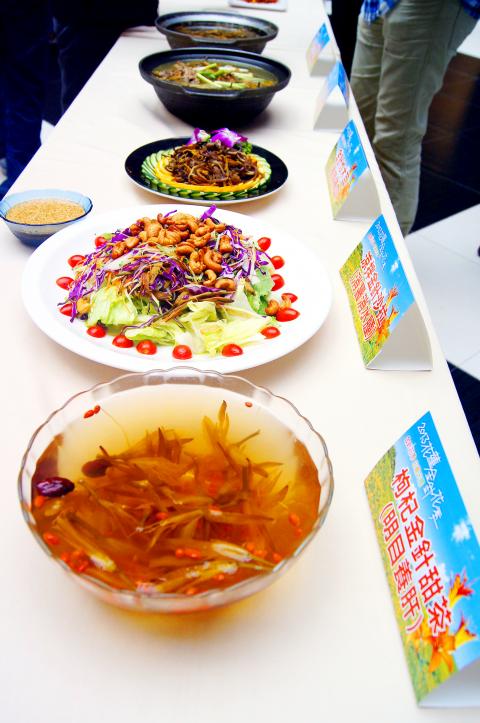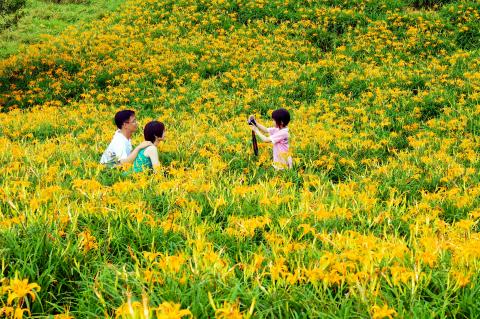Yesterday marked the official opening of the daylily season, which this year aims to be a particularly impressive event. Reports from the Hualien County Government says that over 70 hectares have been reserved for ornamental daylilies near Chike Mountain (赤科山) and Liushidan Mountain (六十石山). The county government is expecting an estimated 100,000 people to visit the county specifically to see the flowers that have been retained for viewing rather than harvesting.
The daylily, also known as the tiger lily or the “forget-worry” plant, is said to have been planted by sons who were planning to be away from home for a long period of time. The flowers were planted to be admired and harvested by mothers so as to reduce longing after their children. It is supposedly also an effective treatment in calming the nerves.
The flower is often seen in local home cooking because it’s high in nutrients and provides a rich source of protein and iron. The festival also highlights restaurants that specialize in the preparation of daylily-based dishes.

Photo courtesy of Hualien County Government
Daylilies lose their harvest value once the flowers bloom, and it’s only government subsidies and the promise of increased tourism to production areas that keeps farmers from harvesting their crop. The effect is spectacular, but it is worth noting that the beautiful blooms have no commercial value other than what tourists contribute by visiting local restaurants to savor the harvested flowers. As often with Taiwan’s festivals, food does matter, and with the daylily festival, it matters more than most.
Many restaurants in and around Chike Mountain and Liushidan Mountain will be serving a wide variety of dishes that use the daylily as their primary ingredient. With greater concern about food safety, the county government has also encouraged the safe processing of daylily. In the past, exposure to sulfur dioxide was a common procedure, as it preserved the golden color of the flower after drying. Sulfur dioxide residue has given rise to health concerns, and the festival also aims to promote greater awareness among farmers, restaurateurs and tourists of this issue.
Chike Mountain and Liushidan Mountain are sometimes described by fevered publicists as the Switzerland of eastern Taiwan, but discounting the improbabilities of such a comparison, the golden flowers create some spectacular, or at least photogenic, scenes.

Photo courtesy of Hualien County Government
The plot is the largest area of daylily to be preserved for purely scenic purposes in Taiwan.
At the press conference announcing the opening of Daylily Festival, Hualien County Commissioner Fu Kun-chi () said this is the third year the government has subsidized scenic daylilies, and is part of a greater push to promote agriculture-related tourism.
Transport information and suggestions relating to accommodation can be found at www.hl-net.com.tw/news/210. The festival officially ends on Sept. 25.

June 23 to June 29 After capturing the walled city of Hsinchu on June 22, 1895, the Japanese hoped to quickly push south and seize control of Taiwan’s entire west coast — but their advance was stalled for more than a month. Not only did local Hakka fighters continue to cause them headaches, resistance forces even attempted to retake the city three times. “We had planned to occupy Anping (Tainan) and Takao (Kaohsiung) as soon as possible, but ever since we took Hsinchu, nearby bandits proclaiming to be ‘righteous people’ (義民) have been destroying train tracks and electrical cables, and gathering in villages

This year will go down in the history books. Taiwan faces enormous turmoil and uncertainty in the coming months. Which political parties are in a good position to handle big changes? All of the main parties are beset with challenges. Taking stock, this column examined the Taiwan People’s Party (TPP) (“Huang Kuo-chang’s choking the life out of the TPP,” May 28, page 12), the Democratic Progressive Party (DPP) (“Challenges amid choppy waters for the DPP,” June 14, page 12) and the Chinese Nationalist Party (KMT) (“KMT struggles to seize opportunities as ‘interesting times’ loom,” June 20, page 11). Times like these can

Dr. Y. Tony Yang, Associate Dean of Health Policy and Population Science at George Washington University, argued last week in a piece for the Taipei Times about former president Ma Ying-jeou (馬英九) leading a student delegation to the People’s Republic of China (PRC) that, “The real question is not whether Ma’s visit helps or hurts Taiwan — it is why Taiwan lacks a sophisticated, multi-track approach to one of the most complex geopolitical relationships in the world” (“Ma’s Visit, DPP’s Blind Spot,” June 18, page 8). Yang contends that the Democratic Progressive Party (DPP) has a blind spot: “By treating any

Swooping low over the banks of a Nile River tributary, an aid flight run by retired American military officers released a stream of food-stuffed sacks over a town emptied by fighting in South Sudan, a country wracked by conflict. Last week’s air drop was the latest in a controversial development — private contracting firms led by former US intelligence officers and military veterans delivering aid to some of the world’s deadliest conflict zones, in operations organized with governments that are combatants in the conflicts. The moves are roiling the global aid community, which warns of a more militarized, politicized and profit-seeking trend